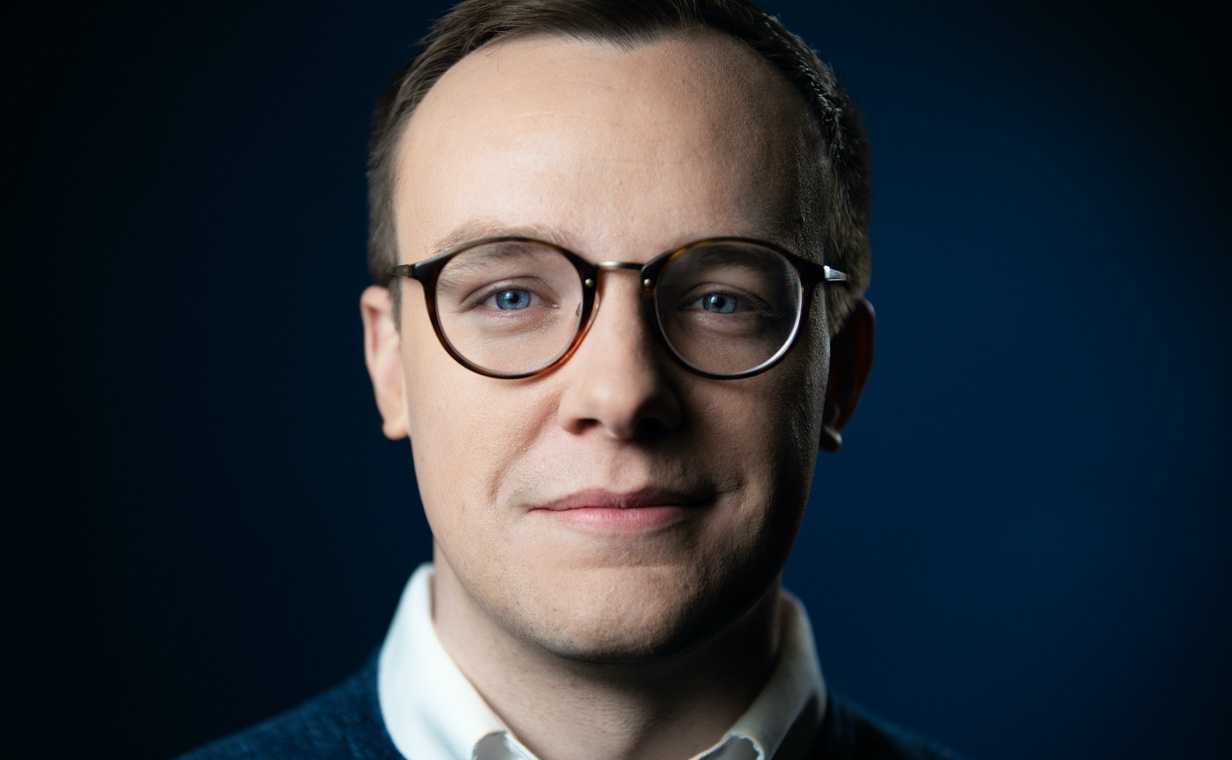
Chasten Buttigieg: Traverse City Roots And What Lies Ahead
By Craig Manning | Aug. 30, 2020
Chasten Buttigieg, husband of former Democratic presidential contender Pete Buttigieg and a Traverse City native, will join the National Writers Series for a free virtual event on September 10 to discuss his memoir, I Have Something to Tell You. The Ticker caught up with Buttigieg to learn about life on the campaign trail, growing up as an LGBTQ+ teen in Traverse City, and where things stand less than 10 weeks from Election Day.
Ticker: It’s been a whirlwind year. There’s been a lot of bad news, but what have been some of the bright spots for you?
Buttigieg: The campaign was grueling but there were so many inspiring moments along the way. It was a year full of really wonderful memories and meetings and getting to inspire so many people. It’s certainly something I never thought I would be doing with my life. And then being at home in quarantine with Peter. We ended the campaign and two weeks later we were in quarantine. We had all these plans to take a vacation together and reconnect on a beach somewhere. Instead, we were back home with our dogs and making three meals a day together. It's really a blessing in disguise for us, because I missed him. We spent a year and a half mostly apart while campaigning, so it was and still is just a gift to have him at home and to have a space where we can be in the same room at the same time.
Ticker: What was life like on the campaign trail? What does a typical day look like in that world?
Buttigieg: It got to the point where people were doing everything for me. I'd wake up and they'd hand me my coffee, and we'd go through the binder of every place we were going and every person we were talking to that day. There were a lot of days where I’d start my day at 4am, go to an airport, fly somewhere, do a couple events, go back to the airport, fly to another state, do a couple more events, and then take a late night flight to the next place so I could start the next day in another state. It got to be sort of like an Olympic feat, in terms of mental agility and emotional agility. You're meeting victims of gun violence, and then you're hosting a teacher roundtable, and you're going to an LGBTQ+ center, and then you're meeting with a group of homeless students, and then you're meeting with a group of Dreamers, and then you're hosting a fundraiser. All day, you're trying to be ‘on’ for everyone, and sometimes that's literally 20 hours a day. I had no idea that's how the campaign would feel, but now it’s alarming being home in quarantine, because it was like going from 100 miles-per-hour to zero.
Ticker: For a few weeks, Pete looked like the Democratic frontrunner, especially after winning Iowa. A month later, he was dropping out of the race. Can you give us a window into your life over those few weeks?
Buttigieg: For a minute, it really was like, 'Holy crap, he might actually pull it off.' But then Iowa was jumbled, and we went into New Hampshire, and we still weren't getting the results. By the time the results were certified, no one cared, because everybody had moved on. And it was heartbreaking. He had come out of nowhere and it was going to be this huge historical moment for our country: the first openly LGBTQ+ person to win a presidential primary, and it really seemed like he was going to pull it off [and contend for the nomination]. And then he didn't, because of how the delays went. It was really frustrating. It was sad…
When it was clear the math wasn't there, I was one of the first people to say, 'Let's go home.' We're very excited to start a family, and we had all these dreams that we had put on hold to run the race. And so I was pretty encouraging [to Pete]. I said, 'You're young. You've got your whole life ahead of you. Let's go home.'
It was a lot though. There's a lot of pressure on him, because it's not just the two of us. It's an entire team. It's a staff of hundreds. It’s thousands of volunteers. And everyone's got their hopes riding on this moment. But in the end, I think we were both excited to come home. And now we've got a lake house up here in Traverse City, and just the other day we were kayaking and going down the river drinking a beer, and I was like, 'Can you imagine where our lives would be right now [if you had gotten the nomination]?' So I'm glad that we got to come home and reconnect and take a breath, and I can't wait to see what [Pete] does next.
Ticker: You've spoken about growing up in Traverse City as an LGBTQ+ teen and how you didn't feel welcome or even particularly safe in high school here.
Buttigieg: I just felt like I could not tell anyone, even in my insular friend groups [that I was gay]. We were not out to one another…We didn't even broach the subject. And a lot of the input I was getting from programs I was in, whether it was youth group, or 4-H, or just being around a lot of more ‘jock’ types like my brothers in sports and athletics, everything I was hearing was that 'Gay people are bad' or 'Gay people are wrong.' And as I was starting to come into my identity, realizing, 'Oh, all of these people are going to hate me once they find out this thing about me,' that's when I did not feel like it was safe to be out at school.
Traverse City has changed so much, and they've pushed the needle really far really fast. But back then, to me it was a given: you don't come out, you don't talk about it, and if you do, really bad things might happen to you.
Ticker: What was it like putting these experiences down on the page for your book?
Buttigieg: One of the goals of the book is to help people feel less alone. That's why I go into some really dark places in the book, and why I talk about a lot of awkward things. In a way, it's kind of a book that I wish I would have had when I was younger. I talk about the awkwardness of dating for the first time, or kissing a boy for the first time, or figuring out who you are. I talk about figuring out the American college system, because I'm a first-generation college student and I didn't really have a lot of mentors for that when I was going through school. I talk about my mother's battle with cancer. All of these things that millions of people go through every day.
It was also a way for me to reclaim my story. I felt like a lot of people had gotten to know me through the campaign, whether it was something they read on social media or in news stories about me, and I just wanted people to get to know me in a different way, in my own words.
Ticker: Less than 10 weeks from Election Day, how are you feeling about the election right now?
Buttigieg: You have to be willing to have conversations with people in your own life about what's at stake. And that requires getting comfortable being uncomfortable, and talking to people about how the decisions that are made in Washington affect people's lives right here in northern Michigan. We have to have those conversations with friends, with our family. You can put up your yard sign, you can retweet really good ads, but we are also going to have to reach out to people directly and help them understand just the weight of this election and what's at stake in our own personal lives, whether it's healthcare, education, women's rights, LGBTQ rights…It's so much more than Trump or Biden. It's our communities, our families, our schools, our marriages.







